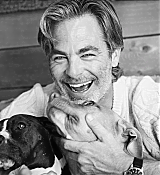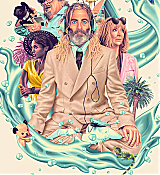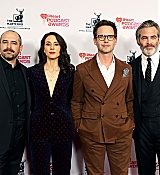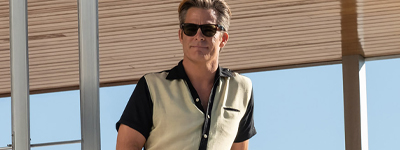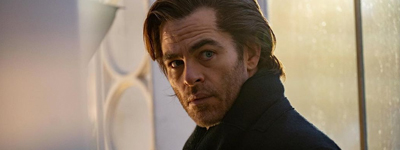
Tony Scott’s latest action flick Unstoppable was inspired by the actual events that placed two railway workers – a veteran engineer and a young conductor – in extraordinary and heroic circumstances. When Will Colson (Chris Pine), who was hired as a result of nepotism, gets paired with Frank Barnes (Denzel Washington), who has 28 years on the job, both realize that the less than ideal situation could make for one very long day. Little do they know, when they leave the rail yard, that an unmanned runaway train will lead to a terrorizing ordeal that will test everyone involved.
A combination of Scott’s filmmaking style and the lack of CGI, in favor of practical sets and real action, contributes to the urgency of the situation from start to finish, taking the audience on an intense, gripping ride. During the film’s press day, co-stars Denzel Washington, Chris Pine and Rosario Dawson, along with Tony Scott, talked about the challenges of making a film like Unstoppable, doing many of their own stunts while on a train going 50 or 60 mph, and getting to meet their real-life heroic counterparts. Check out what they had to say after the jump:
Denzel, can you talk about playing average guys who get pushed into doing heroic things?
WASHINGTON: What’s a not average guy? He’s like most people in the world. I don’t know what “average guy” means, so I don’t worry about that. There’s nothing average about someone who can control a 100,000-ton machine or make it stop or risk his life to do it. I’m the average guy. What they did was not average. I don’t look at it that way. I don’t put characters in a slot before I start.
Tony, was it more challenging to shoot this film or edit it?
TONY SCOTT: To shoot it. I love the challenge, and this was the biggest adventure of my life. We didn’t do what are called major stunts, if you look at movies today, but it was a very dangerous movie to shoot. My goal was to not be inhibited by shooting on a train at 50 or 60 mph. I wanted to take my trade and craft that I use on a stage and apply it to a circle track at 60 mph with three cameras. At the same time, you have to watch that you don’t get in the way of the performance of the actors. But, shooting in real-life situations helps actors because they’re competing against the noise and the wind. Out of that comes things that shift and change, in terms of tone, but not in terms of re-honing the whole sequence.
Chris, what’s the most helpful thing you learned from the real people you talked to?
CHRIS PINE: What was interesting and frightening was that, when we went to the rail yard in L.A., they said the most dangerous place for trains is actually not really out on the track, but it’s in the yard. The trains can be so quiet and so seemingly innocuous, but they’re 100,000-ton beasts. This one guy told the story about this guy who got surprised on the track in the yard. The train was only going 3 or 4 mph, but it pinned the guy and they had to call the family out because the guy was still alive while he was pinned. They said their goodbyes, the train separated from the guy and then he passed away. That’s how dangerous these things are. Also, for pretty much everyone we talked to, everyone had an experience – whether it be a conductor or an engineer – with life and death stuff, like people trying to cross the tracks, and there’s no emergency stop button on a train. A lot of people experienced traumatic events, so there were counselors.
Denzel, did you get to drive a train at all?
WASHINGTON: Yes, getting to drive a train was great. Everything on them hurts. You can step on something or hit your knee. It was dangerous all the time. I was always more nervous because Chris and I were looking forward, and you had all these guys and women around us on this platform going 50 mph, so we could see what was coming, but they couldn’t. It was trippy. But, I couldn’t imagine making this movie on green screen. It wouldn’t work. You wouldn’t know what getting hit by puffed wheat cereal was like.
PINE: When I read the script, it said, “And cue cereal action sequence.” Who knew that cereal could be such a pain in the ass? But, it’s a credit to Tony, too. Everything was practical, so not only were we on train that were moving on tracks, but we had two trains. One train was the regular train, and then another was chopped up so that the cab could be circled by this 360-degree camera. We could run scenes over and over and over again, and feel like we were driving the train, and not be hindered by worrying about the coverage. We could just run the scene, and there was such a freedom and liberty to be able to do that.
Denzel and Chris, how much of the stunts were actually you?
PINE: I didn’t have a stuntman.
WASHINGTON: I had seven.
PINE: He had one for every day of the week.
WASHINGTON: I remember, early on, I was reading the script going, “Why does the other guy get to be the hero? I want to be that guy.” As we kept working on the material, I was like, “Maybe I shouldn’t be the guy jumping. Chris should be the guy. I can see why he’s the guy.” We had very experienced stunt men. They did Casino Royale and they knew how to jump. Chris pissed me off because he was doing a lot of his own stunts. Punk!
SCOTT: D’s got a fear of heights, and I had him up at 25 feet on a 50 mph train, which was no easy task. We mixed and matched stunt guys with the real guys. Chris was really down there between the two trains and the grain was really sugar puffs cereal. They’re hard-coated, so they travel better and they hurt more. They were mixed with potato flakes. I wanted a snow storm, but I couldn’t do it at that time of year, so we came up with the idea of a grain car and the seal breaking. We recreated a grain storm with sugar puffs and potato flakes.
Tony, what was the hardest scene for you to shoot?
SCOTT: It’s when I’m doing the performances, to tell you the honest truth. I look at the guys and hope that I’m covering it and handling it in the right way. Especially when you’re on a train, going at that speed, you have to make sure that, all of a sudden, the logistics don’t take over from the performance. This is about two guys resolving their differences through the course of this journey, which is great, and you’ve got the guys having to come to terms with who they are. It’s a great vehicle for me, in terms of the drama of putting together these two different worlds.
Was all of the trade lingo in the script or did the actors come up with some of that through their own research?
SCOTT: We always do a lot of research and I like to give a validation with the lingo, or the trade craft, as we call it. We put that in the script and sometimes we embelish it and sometimes we tune it back. You don’t want the audience to get confused.
How much time did you guys get to spend with the actual people you were portraying in the film?
PINE: (Conductor) Terry [Forson] and (engineer) Jess [Knowlton] came out here and we went to the Pig ‘N Whistle and had a couple of beers and talked. It was great. In real life, they say that they were married to one another for awhile, in the sense that they were conductor and engineer together. They were a couple. What was really interested from talking to them was learning that that hierarchy in the train is very real. Those guys that are old heads and have been around for a long time demand a certain level of respect. Just because the newbie has gone to school and learned to do his job doesn’t mean that he knows all the ins and outs of the job itself, in practicality. They told a lot of stories about, if a newbie came in and was pressing his luck, in terms of trying to show the old guys how it was done, he was in for a world of hurt.
SCOTT: Research is what drives me. When I get a script, I go to the real world and touch the real people. Chris’ character, Terry, was a pretty boy who got the job because of nepotism. That’s what turned me around. Originally, I was thinking “blue collar,” but then I met these two guys and we took from their lives and put it in the characters in the script. It was great. I get to educate and entertain myself by touching these worlds and these people.
ROSARIO DAWSON: That’s how Hooters came into the script.
WASHINGTON: Yeah, Jesse’s daughters really worked at Hooters.
DAWSON: I love that ‘cause it seems like one of those Hollywood things, but it’s true research.
Rosario, can you talk about developing the strength of your character?
DAWSON: I think that was something really amazing that we had an opportunity to create with her. We had a lot of choices to make about how we were going to express Connie. There are a lot of cliches about a woman in a man’s world, and there are a lot of cliches about a woman in a high position of power and how she should behave. I think we walked that line really well and were very clear about what we wanted Connie to come across as. She’s just someone very capable and sensible. At the end of the film, you’re not thinking about her being a woman in a man’s world, but just the right person for a very stressful situation. She’s someone who doesn’t get hysterical, but we wanted to express the frustration of being in this control room, miles away from where all the action is. We wanted to show, as calm and collected as she is, that if she could physically propel herself out a window and into that train and pull that lever herself, she would. That’s what makes the octopus arms come out and get on every phone and do anything that she could possibly do to make those blinking lights go the way she wants them to. That was something that we really played with, to show how her levels of emotion were and how much she showed to other people. It is a high-stress situation and she’s in charge, so you can’t freak everybody out or panic them. Your options disappear as the time goes by, so you don’t have time to freak out. You have to do the next thing, protocol wise, that’s going to save lives.
Denzel, now that you’ve worked with Tony five times, do you have a shorthand with each other?
WASHINGTON: Obviously, I think there’s a shorthand. He knows how I like to work, and I know what he likes to do. He knows I like research, so he’s going to have a ton of stuff, long before we start.
SCOTT: There’s never been a complacency with the work. Both of us are similar. We’re all researching for difference. We don’t want to repeat ourselves. That’s my goal. With every movie I do and every day I go to work, my goal is not just to reach for difference, but also figure out how to look at this world and these characters in a different way, and Denzel does the same. He reaches back inside himself and finds a different aspect of his personality. We’ve done five movies and every character is very different, from Crimson Tide to Man on Fire to this film.
Do you still learn about the craft of filmmaking from Tony?
WASHINGTON: I definitely know that I cannot do what he does. What he does is make films. I’ve directed a couple films. That has nothing to do with what he’s doing. I’ve learned so much from him.
Rosario, what was it like to work with Denzel again?
DAWSON: In the one scene that we had together, it was brilliant. It’s interesting because on the last movie that we did together (He Got Game), we also only had one scene together. Maybe we can figure out how to have a couple more scenes together in the next movie. That would be really, really nice. It’s an amazing, odd and interesting thing to watch how impressive it is, and it’s something that Tony is such a genius at, to have a great, fun ride in an action film where you actually care about everybody. The time is taken to really establish the different types of personalities there and give them time. Even if some of the conversation seems mundane or inane, it’s deeply connecting you to caring about these characters, as the story goes along, which is very unusual for an action film of this kind. I think it’s just amazing and remarkable that I feel there’s a chemistry between Frank and Connie, that was only brought together because of Tony being able to gauge our performances, in the weeks and months that were separated between them while we were in different cities. It’s magical to me that, in that one moment at the end of the movie, you can see chemistry and a comradery of spirit. They’re cut of the same cloth. They’re people of the same stock. They would appreciate each other and get what each other’s deep connection to doing life. You can see a hereafter after that, and that’s something really amazing. But, personally, I would like to flush that out on screen a little bit more next time.
Chris, you obviously must be dealing with offers on a different scale after Star Trek. How are you choosing roles now, at this point?
PINE: I’ve just been very blessed. It’s such a shock to me that people seem very interested in who I am and what I do, and that I get to work with people that I’ve watched since I was a kid. Star Trek has really afforded me the luxury of choice and being able to cherry pick, for I don’t know how long. I’m in a time right now where I can at least say yes and no to certain things. I think the guiding principal for me is working with people who I want to work with. Because I don’t know how long it’s going to last, I want to seize the moment. I’ve been very lucky.
Are you getting any input into the development of Star Trek 2?
PINE: Nope.
